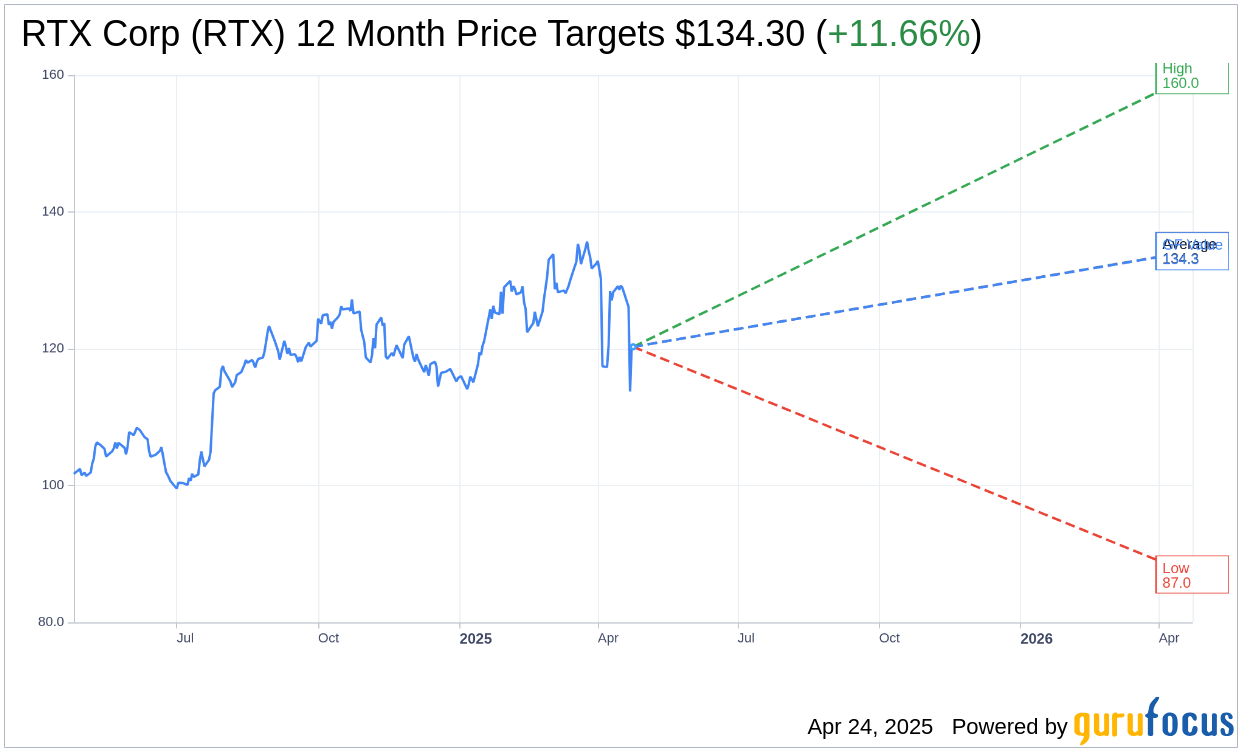BofA analyst Ronald Epstein has revised the price target for RTX (RTX, Financial), lowering it from $155 to $150 while maintaining a Buy rating for the stock. This adjustment comes in response to the company's recent guidance regarding the potential impact of tariffs, a factor that investors are scrutinizing closely. Although RTX has provided a framework to assess the situation, market sentiment appears to have adopted a worst-case scenario approach as a baseline, potentially overestimating the challenges.
The analyst emphasizes that, despite the aerospace and defense sector's unfamiliarity with tariff navigation, the market's reaction is excessive. BofA remains optimistic about RTX's capability to handle tariff-related challenges effectively. Epstein suggests that current market concerns have created a particularly appealing opportunity for investors to acquire RTX shares, as the anxiety surrounding tariffs may be overstated.
Wall Street Analysts Forecast

Based on the one-year price targets offered by 21 analysts, the average target price for RTX Corp (RTX, Financial) is $134.30 with a high estimate of $160.00 and a low estimate of $87.00. The average target implies an upside of 11.66% from the current price of $120.28. More detailed estimate data can be found on the RTX Corp (RTX) Forecast page.
Based on the consensus recommendation from 26 brokerage firms, RTX Corp's (RTX, Financial) average brokerage recommendation is currently 2.3, indicating "Outperform" status. The rating scale ranges from 1 to 5, where 1 signifies Strong Buy, and 5 denotes Sell.
Based on GuruFocus estimates, the estimated GF Value for RTX Corp (RTX, Financial) in one year is $134.25, suggesting a upside of 11.61% from the current price of $120.28. GF Value is GuruFocus' estimate of the fair value that the stock should be traded at. It is calculated based on the historical multiples the stock has traded at previously, as well as past business growth and the future estimates of the business' performance. More detailed data can be found on the RTX Corp (RTX) Summary page.
RTX Key Business Developments
Release Date: April 22, 2025
- Organic Sales Growth: 8% increase.
- Segment Margin Expansion: 120 basis points improvement.
- Free Cash Flow: $900 million improvement versus prior year.
- Commercial Aftermarket Sales: Up 21%.
- Commercial OE Sales: Up 3%.
- Defense Sales: Up 4%.
- Adjusted Sales: $20.3 billion, up 5% overall and 8% organically.
- Segment Operating Profit: $2.5 billion, up 18%.
- Adjusted Earnings Per Share (EPS): $1.47, up 10% from prior year.
- GAAP EPS from Continuing Operations: $1.14.
- Free Cash Flow: $792 million in the quarter.
- Capital Returned to Shareowners: $890 million, primarily through dividends.
- Backlog: $217 billion, up 8% year-over-year.
- Collins Sales: $7.2 billion, up 8% adjusted and 9% organically.
- Pratt & Whitney Sales: $7.4 billion, up 14% adjusted and organic.
- Raytheon Sales: $6.3 billion, down 5% adjusted, up 2% organically.
- Raytheon Book-to-Bill Ratio: 0.70 for the quarter, 1.35 on a rolling 12-month basis.
For the complete transcript of the earnings call, please refer to the full earnings call transcript.
Positive Points
- RTX Corp (RTX, Financial) reported an 8% organic sales growth in the first quarter of 2025.
- The company achieved a 120 basis points expansion in segment margins, with strong contributions from all business segments.
- Commercial aftermarket sales increased by 21%, and defense sales grew by 4% year-over-year.
- RTX Corp (RTX) generated strong free cash flow, improving by $900 million compared to the previous year.
- The company made significant progress in its innovation pipeline, including FAA certification for the GTF Advantage and advancements in the LTAMDS program.
Negative Points
- RTX Corp (RTX) faces potential cost impacts of $850 million due to tariffs, which could affect profitability if they remain in place.
- The company has not included potential tariff impacts in its outlook for the year, indicating uncertainty in financial projections.
- There are concerns about supply chain disruptions due to tariffs, which could impact operational efficiency.
- The Raytheon segment experienced a 5% decline in adjusted sales due to the divestiture of the Cybersecurity business.
- The company is closely monitoring the dynamic global trade environment, which poses risks to its operations and financial performance.
